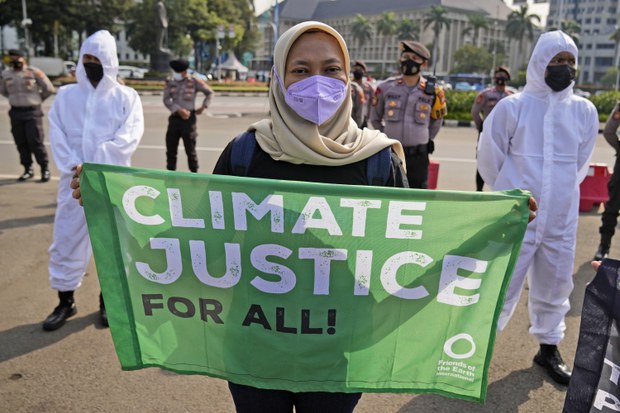Climate-related court cases more than doubled in five years, UN says
Share

An activist holds a banner as police officers in protective suits look on during a climate protest in Jakarta, Indonesia, Nov. 5, 2021.
The number of climate change-related court cases has more than doubled in five years and is growing globally, as impacts range from droughts and heat waves to water shortages, a new U.N. report said.
In 2017, there were 884 legal actions, whereas the number had risen to 2,180 last year, said the 2023 Global Climate Litigation Report, published Thursday by the U.N. Environment Programme (UNEP) and the Sabin Center for Climate Change Law at Columbia University.
These lawsuits were initiated across 65 different entities worldwide, brought in front of international, regional, and national courts, tribunals, quasi-judicial bodies, and other adjudicatory institutions. The figure also includes special procedures of the United Nations and arbitration tribunals.
With extreme heat baking Europe to Asia to North America and the likelihood of disasters rising, “more people are increasingly turning to the courts” to find solutions, advance climate action, and hold governments and the private sector accountable, Andy Raine, the head of international environmental law at UNEP, said in an online press conference.
Such litigation could serve as a vital tool in delivering climate justice, he added.
The report’s findings are based on a review of cases focused on climate change law, policy or science. It comes just a day before the first anniversary of the U.N. General Assembly’s declaration of access to a clean and healthy environment as a universal human right.
Several legal cases have arisen challenging government decisions that conflict with the objectives of the Paris Agreement or a nation’s net-zero commitments, while the increasing awareness of climate change has also prompted legal action against corporations, aiming to hold fossil fuel companies and other greenhouse gas emitters accountable for contributing to climate damage.
The report says courts are finding strong human rights linkages to climate change, leading to greater protection for the most vulnerable groups in society, compelling governments and corporations to pursue more ambitious climate change mitigation and adaptation goals.
Indonesia leads cases in Asia
Although the United States leads the charts with 1,522 cases. About 17% of lawsuits have been filed in developing countries, including Small Island Developing States.
In the Asia-Pacific, Indonesia saw the most lawsuits with 12 cases, most of them brought by the government against palm oil, mining and logging companies for destroying peatland ecosystems, according to the report.
There were 11 legal actions filed in India, while China, the world’s top greenhouse gas emitter, had only two. The report did not say what those cases were.
“In China, we have just started to see some litigation. I think it’s a little more challenging,” said Maria Antonia Tigre, a senior global climate change litigation fellow at the Sabin Center.
“There are no cases against governments, for example. They are usually corporate cases, also related to specific projects mostly.”
Raine, who recently met a few Chinese judges, said there seems to be some willingness in the judiciary to allow climate litigation in the future and a commitment to develop specialized capacity around environmental cases.
“Recently, the country amended its domestic public interest environmental modification legal framework, which does allow the Supreme People’s Procuratorate, which is part of the government that can bring cases against the government, to bring cases and also to allow NGOs to bring cases under certain circumstances,” he told RFA.
Thursday’s report said there were also at least 34 instances where cases have been brought by or on behalf of children and youth under 25 years old, with some involving girls as young as seven and nine years old in Pakistan and India, respectively.
The report also mentioned the determination made by the Commission on Human Rights’ National Inquiry on Climate Change in the Philippines that 47 prominent oil and gas companies bear a corporate responsibility to conduct human rights due diligence and offer remediation measures.
In March 2023, the Pacific Island nation of Vanuatu won a major victory when it convinced the United Nations General Assembly to pass a resolution aiming to request an advisory opinion from the International Court of Justice regarding the responsibilities of nations concerning climate change for both current and future generations.
The report predicts an increase in climate migration cases, as well as lawsuits addressing liability issues in the aftermath of extreme weather events and “backlash” cases as companies seek to protect fossil fuel operations against such climate litigation.
Edited by Mike Firn.







